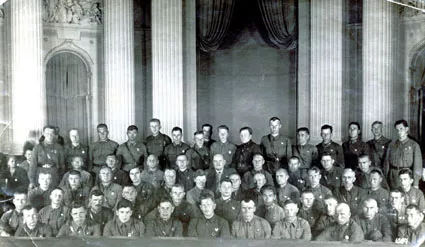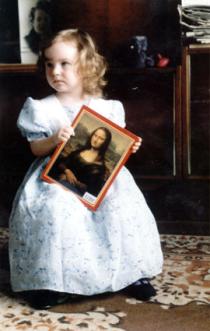This photo was taken at the ceremony of governmental awards in the Kremlin in 1942. I was awarded a medal 'For Work Accomplishments' in 1940, but I couldn't pick it up before since I was far from Moscow. In the center Deputy Chairman of Supreme Soviet of the USSR Badaev presents the awards.
In 1937 I was offered a job at the Komsomol construction site in Nakhodka [Far East, 8000 km from Kiev] where they were building a shipyard. My friends and I went to the Far East on a Komsomol assignment. There was a big shipyard to be built. This was a gigantic construction site and there were probably about ten thousand workers to be involved. We were accommodated in barracks and in few months we moved to a hostel that was like a barrack only there were more comforts. We worked three shifts and the night shift was the most difficult, but we were young and made a strong team. There was no national segregation: workers were the children of proletariat and peasantry. They came from various towns of the USSR. We worked and were equal. I was soon elected leader of our crew of ship mechanics. Since we completed our five-year plans and did higher scopes of work than scheduled I was awarded a medal 'For Work Achievements' by the government. It was a very honorable award handed by high officials in the Kremlin. We were invited to Moscow to receive our awards, but it was too far from where I was and I decided to postpone this trip until I went to visit my parents in Kiev. My plans were not to come true: the Great Patriotic War began [World War II].
I was at a training near Moscow when the war began. In 1940 I and some other young builders were sent to have advanced training at a big plant in a small town near Moscow. I don't remember its name. It was a 6-month course and upon its completion I was to become an engineer. On 20th June 1941 we received our certificates and on 22nd June the Great Patriotic War began. I went to the military registry office. However, in those first days only those born in 1915 were recruited. I didn't go back to the Far East since I had been registered at the registry office near Moscow and was to wait for their further instructions. I began to work as a mechanic at same plant where I had training and lived in the hostel of the plant.
Between 1941- spring 1942 I was called to take training as a Navy officer three times. I knew that before long I was going to be recruited to the Navy. In winter 1942 I wrote a letter to the Kremlin requesting them to give me my award, that I was supposed to have received back in 1940, but never actually got time to get it. I got an invitation to come there. There were over 100 other young people. Mr. Badaev, Deputy Chairman of the Supreme Soviet of the USSR, [The Supreme Soviet (Supreme Council), comprised the highest legislative body in the Soviet Union and the only one with the power to pass constitutional amendments.] was giving awards this time. We were photographed after the ceremony was over. In May 1942 I was recruited to the army in the rank of lieutenant.












